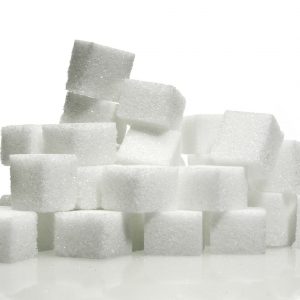Facts About Sugar
Sugar is a sweet, crystalline carbohydrate obtained primarily from sugar cane or sugar beets. Sugar can be categorized as Natural or Processed (Refined). Natural sugars are found in fruits, vegetables, grains, and milk. Processed sugars are sugars added while making a product to improve its taste or help preserve it. Some common products with added sugars are cookies, bread, cereals, soda, sports drinks, canned foods, frozen foods and prepared sauces.
Some Common Names for Sugar on Nutrition Labels:
- Brown sugar
- Cane sugar
- Corn syrup
- Evaporated cane juice
- Fructose
- Fruit juice concentrate
- High-fructose corn syrup
- Honey
- Lactose
- Molasses
How Much Sugar Should You Have?
The American Heart Association recommends no more than 6 teaspoons (24g) of added sugars for women and children, no more than 9 teaspoons (36g) for men per day. Children under 2 should not have any added sugar.
What Happens When You Have Too Much Sugar?
Eating too much sugar can cause many different health problems such as tooth decay, obesity and its related diseases such as type 2 diabetes, fatty liver and heart disease. Processed sugars are especially bad because they add calories, but no nutritional value to foods. This form of sugar is broken down quickly by the body, resulting in a sharp rise in blood sugar levels which can increase the risk of type 2 diabetes and weight gain.
Sugar Content in Common Beverages (8 oz= 1 cup; 1 teaspoon= 4 grams)
| Portion Size | Teaspoons of Sugar | Grams of Sugar | |
| 100% Fruit juice | 12 oz | 8-14 | 33-58 |
| Boba tea (tapioca drink) | 12oz | 7-12 | 30-50 |
| Soda | 12oz | 10 | 40 |
| Frappuccino coffee drink | 12 oz | 10 | 40 |
| Fruit punch (fruit drink) | 12 oz | 9 | 36 |
| Energy drink | 12 oz | 9-11 | 36-44 |
| Sports drink | 12 oz | 5 | 21 |
Ways to Reduce Your Sugar Intake
- Read nutrition labels to check for hidden sugars
- choose products with less than 2 teaspoons (8g) of sugar per serving
- choose products that list sugar near the end of the ingredient list (this means that the product contains a lower amount of added sugar)
- Buy unsweetened cereals/ yogurt and add fresh or dried fruits to sweeten
- Eat fruit instead of cake or pie for dessert
- Snack on nuts, fruits, low fat crackers instead of candies
- Drink water or low fat milk instead of soda or other high sugar drinks
- Limit 100% fruit juice to no more than 8 oz daily
- Reduce portion sizes of sugary drinks, desserts and other sweets
- Reduce the amount of sugar in your recipes
References:
https://www.cdc.gov/nutrition/data-statistics/know-your-limit-for-added-sugars.html



